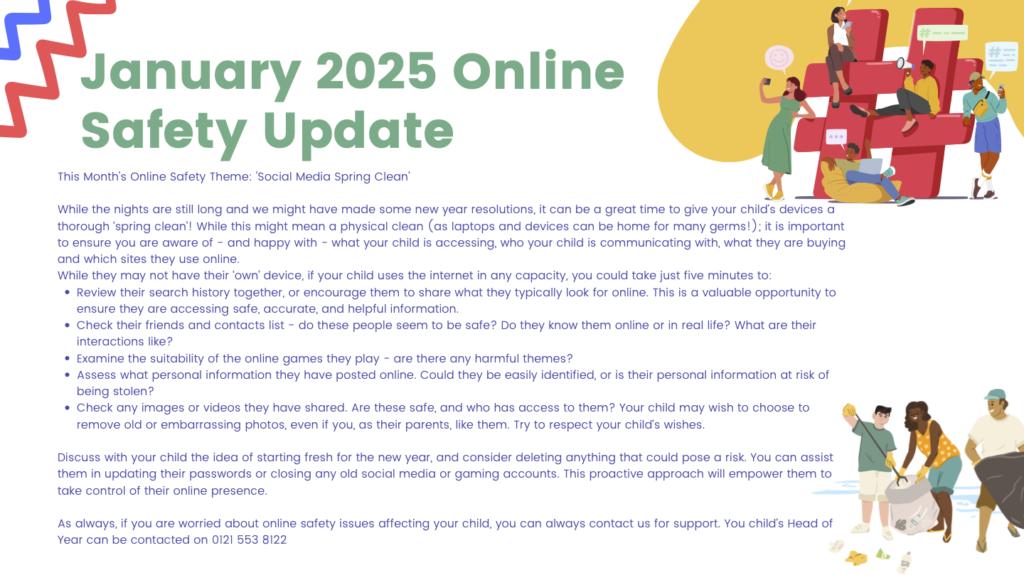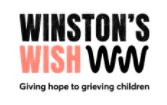Safeguarding is a priority at King Edward VI Handsworth Wood Girls’ Academy and we endeavour to keep our students safe at all times. We have a dedicated Child Protection team (also known as our Safeguarding Team) that comprises of the Designated Safeguarding Lead (DSL) and a team of deputies. Our DSL is Mrs M Sahonta and she can be contacted by email on msahonta@hwga.org.uk. You can also call her on 0121 554 8122.
There is also a strong Student Welfare Team who are always available for young people and families for advice and support. Please contact the academy if you need any support for your daughter.
The Student Welfare Team are always available for children and young people to talk to about any worries or concerns that they may have.
The Student Welfare Team are:
- Senior Assistant Headteacher – Pastoral Care and Standards
- Assistant Headteacher – Welfare and Wellbeing (Lead DSL)
- SENCO and EAL Lead
- Safeguarding Manager
- Pastoral Managers
- Heads of Year
- Health and Wellbeing Lead
- Form Tutors
- Attendance Officer

| Link | |
|---|---|
| Safeguarding @ King Edward VI Handsworth Wood Girls’ Academy | Go to |
| SHARP System Don’t Suffer In Silence, Make A Report. |
Go to |
| Report Harmful Content | Go to |
| Looked After Children Policy and Procedures | Download |
| Safeguarding and Child Protection Policy | Download |
| Safeguarding Policy Appendix | Download |
Our School Help Advice Reporting Page (SHARP) System.
Our Safeguarding Team can and will help with any problems or issues you may have inside or outside of our academy. Furthermore, if you see or hear of any issues that concern you (eg a problem that your friend or another student may be facing) then you are welcome to report these to our Safeguarding Team too using this system.
All members of the Student Welfare Team hold at least one of the following qualifications, in order to ensure that all of our students receive the best care from us:
- Mental Heath First Aid
- Physical First Aid
- Cognitive Behaviour Therapy Diploma
- Drawing and Talking Therapy
- ASIST (Applied Suicide Intervention Skills Training), which is suicide prevention training
Furthermore, we work closely and tirelessly with the appropriate agencies in order to secure external support for our students when required from qualified counsellors, an Educational Psychologist and mental health nurses to name but three.

Please see below for links to external websites that young people and families can access for support with mental health and wellbeing issues:
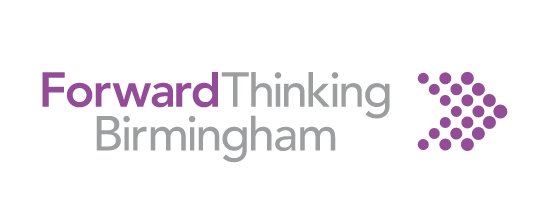 Mental health support for residents of Birmingham
Mental health support for residents of Birmingham
 Charity that supports young people’s mental health.
Charity that supports young people’s mental health.
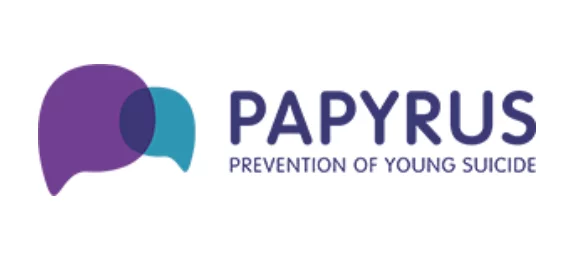 Charity for prevention of suicide
Charity for prevention of suicide
 NHS website giving advice on healthy lifestyles.
NHS website giving advice on healthy lifestyles.
 Advice and support for children and young people on all matters.
Advice and support for children and young people on all matters.
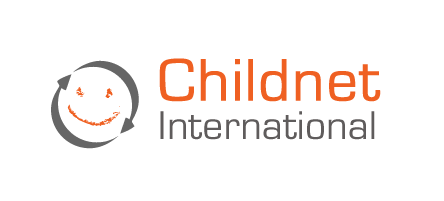 Charity to help young people use online resources safely.
Charity to help young people use online resources safely.
 Bereavement support for young people.
Bereavement support for young people.
- Standards – Supporting you to meet our standards by ensuring frameworks are student-friendly for you. Flowcharts and clear guidance from specialist staff are provide
- Attendance – Ensuring our attendance strategies are reflective/purposeful and bespoke to each and every one of you. We have regular meetings including many staff to ensure a holistic approach to your attendance.
- Safeguarding – Wide approach to ensuring safeguarding you is considered at all times. Giving you, your families and staff routes to report and assist promptly.
- Mental Health Support / Mentoring – We have trained counsellors and mentors both internal and external and including a Health and Wellbeing lead to support you and your families. You can self refer to services and drop-in to available clinics.
- Specialist Staff – We have a wide and varied staff team including trained counsellors/mentors/ trained behaviour specialists and staff who are specialists in their key stages.We have a number of deputy Safeguarding leads to ensure support is consistent and reflective of the needs of you.
- Climate for Learning – Holistic approach towards Quality of Education and Climate for your learning.Ensuring that both elements support one another and work hand in hand.
- Rewards – Supporting you through precise praise using HPL Language.
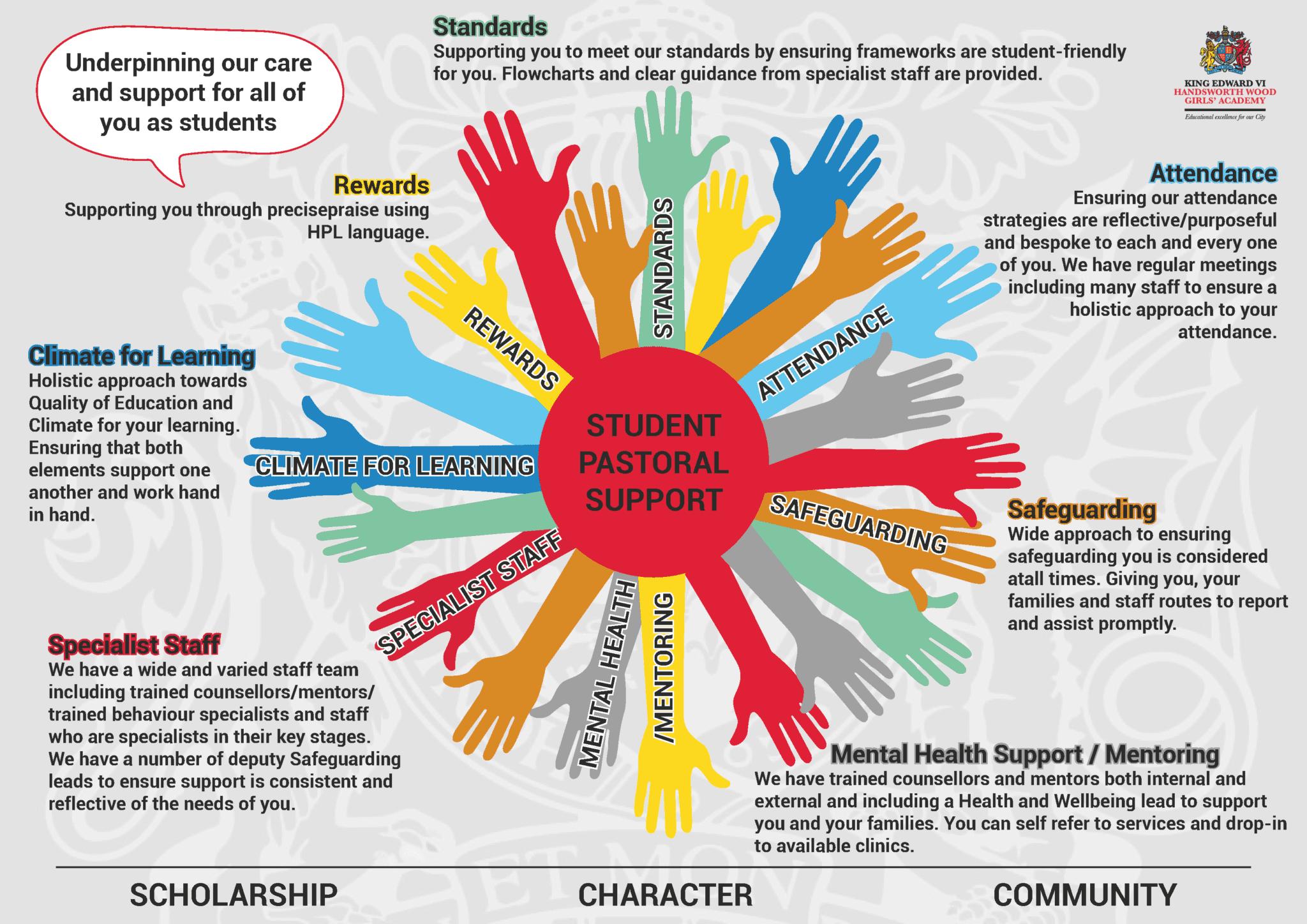
Our wonderful pastoral team have put together a number of presentations for you to explain their roles and the systems we have in place to support our students.
Equality, Diversity and Inclusion at HWGA
Girls on Board
E-Safety
Housing
For support with housing issues, you can email Birmingham City Council Homeless Link for support:
https://www.birmingham.gov.uk/info/20207/homelessness/1191/homelessness_services
If you and your partner (if you have one) are under the age of 25 and have no children, you will need to attend St Basils Youth Hub instead. You can phone them on 0300 303 0099.
Shelter is the main UK charity that focusses on homelessness and home insecurity. They have a fantastic ‘Get Help’ section including a helpline. They can refer and signpost to local services that can help.
Crime including hate crimes
If you are affected by anti-social behaviour in your local neighbourhood, you can report this on the Birmingham City Council website
Remember you can call the police on 999 in an emergency or 101 in a non-emergency situation. You can also use the online reporting service on the West Midlands Police Website.
If you need support as a victim of crime, you can take a look on this website:
https://www.gov.uk/get-support-as-a-victim-of-crime
Worried about the safety or welfare of a child or adult
If you need to speak to a children’s social worker because you are worried that a child is not safe, or you need additional support, you can contact Birmingham CASS (Children’s Advice and Support Service) on 0121 303 1888.
Mental Health
You might need support for your child’s mental health or your own. Below are some options for services that could help:
- Samaritans: 116 123
- www.mind.org.uk
- C.A.L.M (Campaign Against Living Miserably): 0800 58 58 58
- Support for men: www.andysmanclub.co.uk
- Support for BAME people: www.blackmindsmatteruk.com
For children and young people:
- Childline 0800 11 11
- SHOUT Text Support – Text SHOUT to 85258
- www.kooth.com
Health issues
If you want to access support to help you reduce or stop your drinking of alcohol, or use of drugs, you can contact CGL (Change, Grow, Live)
Website: https://www.changegrowlive.org/
CGL is a free and confidential drug and alcohol service for adults and affected others in Birmingham. CGL provide treatment and recovery services to support anyone experiencing difficulties with drugs and/or alcohol including confidential advice and information, care packages, healthcare clinics, residential detox, housing support, detox in a box, aftercare and family support.
If you are under 18 and are worried about drug and alcohol misuse, you can contact Aquarius:
Aquarius Charity Birmingham (Under 18’s Service)
Tel: 0121 622 8181
Email: birmingham@aquarius.org.uk
Website: www.aquarius.org.uk
Alternatively try reading the Talk2Frank website which gives clear information about the risks.
You can find your nearest health services (GP, pharmacy, sexual health clinic etc) using the ‘Service Search’ function on www.nhs.uk If you need health advice, you can call NHS 111.
Financial issues and debt
If you are struggling with debt or finances, contact:
- CAP (Christians Against Poverty) – www.capuk.org
- Citizen’s Advice Bureau – www.citizensadvice.org.uk
- Look on www.moneyhelper.org.uk to find your nearest free, impartial debt advice service.
- Look on the Trussell Trust website for your nearest food bank
Domestic Abuse
If you are experiencing domestic abuse, you can call:
- Refuge’s National Domestic Abuse Helpline: 0808 2000 247
- For LGBTQ+ people experiencing abuse, call GALOP on 0800 999 5428
- Roshni is a domestic abuse service in the West Midlands specialising in Forced Marriage and so-called ‘honour’-based abuse. (roshnibirmingham.org.uk)
- Men’s Advice Line for men who are experiencing domestic abuse: 0808 8010327
- Black Country Women’s Aid: 0121 5530090 (https://blackcountrywomensaid.co.uk/)
- Birmingham and Solihull Women’s Aid (BSWAID.org)
Other Useful Links
Lots of restaurants, cafes and supermarkets run deals throughout the holidays where kids eat free or cheap if an adult buys a meal. You can find a list here:
www.moneysavingexpert.com
If you are going on holiday or will be near water (seas, lakes, rivers etc) at any point; it’s important to stay water-safe. The Royal Lifesaving Society has a free advice booklet for parents: www.rlss.org.uk
Remember that if you don’t have internet access, your local library has free computers to use with free wifi. They even have librarians who are trained to help you. find your nearest library here: www.gov.uk.
Within this section we will take you through some of the key safeguarding areas within Handsworth Wood and the wider community of Birmingham, providing you with information and resources to help if your family or community encounters any of these issues.
What is Early Help?
In a nutshell
Early Help basically means that there is support available for families when they need some help/advice around problems that might be arising. The point of Early Help is to get in early before things reach crisis point.
What can you help with?
Every family has issues from time to time, from concerns around Online Safety, to needing support for debt and benefits issues, to issues with housing and support with parenting.
In school support
Every school has a responsibility to do what they can to support families, at an early stage. At HWGA, we offer early help interventions including uniform vouchers, signposting to agencies, hospitality (if required), attendance support, Chai and Chat sessions, Perry Barr locality Housing Team visits, parent workshops etc. Contact reception if you would like to explore this further or need support with something.
Referrals
Birmingham City Council also has an Early Help offering available for all families as part of Children’s Services. You can read more here:
www.birminghamchildrenstrust.co.uk
You can either complete the form yourself that is available through this link or ask the pastoral managers at HWGA to support you to make this referral for support.
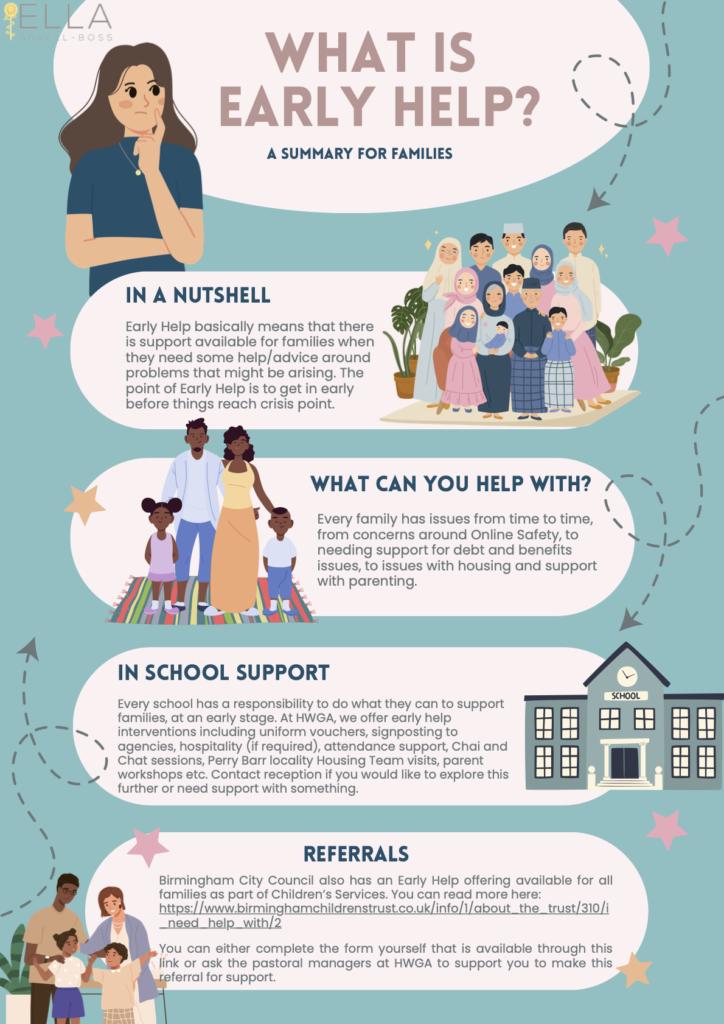
A summary of consent
Consent is important
Consent is vital when it comes to relationships. In a healthy relationship, both people have a right to their choices. A good partner should always respect and prioritise their partner’s choices and happiness in the things they decide to do together.
Legalities
When it comes to sex and sexual activity (including kissing and physical contact), consent is the most important thing. Without consent, we do not have sex – we have rape and sexual assault. It is illegal to engage in sexual activity with someone without their consent.
Remember
- Consent is the same and just as important regardless of your gender identity or whether you are in a heterosexual or homosexual relationship.
- We are allowed to change our mind and withdraw consent.
- Consent for one thing is not consent for everything (just because you’ve consented to a cuddle, does not mean you have consented to oral sex for example.
- Consent once, is not consent always…you have the right to say ‘not today’!
- Just because you’ve given consent to one person, does not mean you have given consent to all people
- If you are not sure if someone is consenting, ask!
- Just because someone has not said no, does not mean they have said yes.
- You don’t always need to give a reason – ‘no’ is enough.
- Just because someone is your friend, sexual partner, boyfriend, girlfriend or husband, does NOT mean they don’t need your consent to do something.
3 Elements to consent
- Freedom
Ask yourself – am I free to say yes or no? …without any negative consequences? This includes sulking, demands to know why, falling out with you, threats, or a negative impact on your life.
- Ability
This one is pretty simple: Do you have the ability to consent – and understand what you are consenting to? You cannot give consent if you are:
- drunk, high, asleep, unconscious
- too young to fully understand what you are consenting to.
- EnthusiasmAsk yourself: ‘Do I actually want this? Am I happy about it? Is this something I would choose?’
- Think about body language! Getting someone to say the word ‘yes’ DOES NOT MEAN they have consented. Sex and relationships are supposed to be fun and make you feel good. If that’s not the case, talk to someone.
Think about Pie
If you bought a pie, you would not eat it if there was already a slice missing. In the same way – consent is like a pie cut into 3 slices – if you don’t have them all, you don’t have consent!
The 3 slices of the pie are all equally important – FREEDOM, ENTHUSIASM AND CAPACITY.
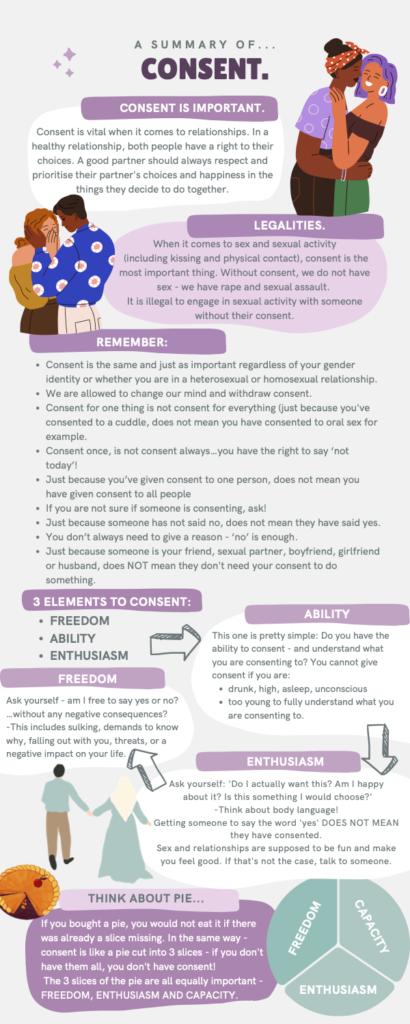
A summary of Sexual Violence and Sexual Harassment
What is Sexual Violence?
Sexual violence is illegal and might include rape, sexual assault or assault by penetration. It is important not to equate sexual violence with sex as sex should be a pleasurable act between consenting people over the age of 16. Sexual violence on the other hand, involves one person harming another without their consent. It’s often linked to one person wanting to have power and control over another.
What is Sexual Harassment?
Sexual harassment is a form of unlawful discrimination under the Equality Act 2010. The law says it’s sexual harassment ‘if the behaviour is either meant to, or has the effect of violating your dignity, or creating an intimidating, hostile, degrading, humiliating or offensive environment’. It might involve sexual jokes, unwanted sexual touching or comments/questions about someone’s body or their sexual preferences.
Remember
- Sexual violence and harassment happen both online and offline and the perpetrator may be an individual or a group of people.
- Sexual Harassment is not ‘banter’ or ‘boys will be boys’ – it is unacceptable and against the law.
- Perpetrators of sexual violence and sexual harassment may be adults or could be other YP. This is known as ‘Child-on-Child abuse’.
- Sexual violence does not just happen to women and girls. Boys and non-binary people can be victims too. Sexual violence and sexual harassment also happens in LGBTQ+ relationships.
- For perpetrators, sexual violence is often about power and control rather than sexual desire. Victims can often blame themselves for their own behaviour, what they had to drink or what they wore but there is NEVER any excuse for sexual violence.
- Sexual violence can happen between strangers or, more commonly, between people who already know each other. Everyone has the right to give or withdraw consent for sexual activity. If there is not consent, it is not sex – it is sexual violence.
- Sexual harassment is discrimination and is against the law. It is not just something women have to ‘get on with’.
Victims
Sexual Violence and Sexual Harassment are what is known as a ‘gendered problem’. This means they can happen to people of any gender identity however statistically, they overwhelmingly affect one gender more than any others – women and girls. Furthermore, statistically, perpetrators are mostly (not always) men and boys. The main thing to remember is that it is NEVER the victim’s fault.
Stealthing
‘Stealthing’ is a form of SV. It is where a partner removes or damages a condom without their partner’s consent, in the middle of sexual activity. It can be highly distressing and can lead to unwanted pregnancy and STIs. Remember, any part of sex without consent is sexual violence.
Technology
SV and SH can take place online too – and the effects can be just as serious as offline abuse. Upskirting, downblousing and cyber-flashing are all forms of sexual violence. Revenge porn and bombarding someone with sexual messages or demands for nude images are also illegal. If these things happen, there is lots of support available.
Support
If you are worried about yourself or another YP being subjected to sexual violence or sexual harassment, it is important to seek help. You can call Childline on 0800 11 11 or Women’s Aid on 0808 800 0028. You can report online SH via the CEOP website. If someone is threatening you with Revenge Porn, you can use the Childline Report Remove Tool to help remove your images from the internet.
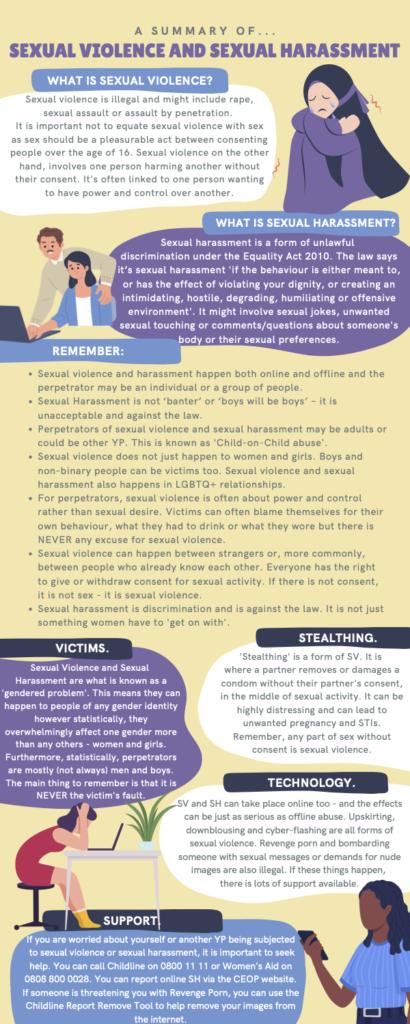
A summary of exploitation and grooming
What is grooming?
Grooming is the term we use to describe when someone (or a group of people) builds a relationship, trust and emotional connection with a child/young person with the purpose of manipulating, exploiting and abusing them. Ultimately, the aim is to build up trust so they can exert increasing control over the victim. The plan from the start is always to take advantage of the victim and use them for their own gain.
Why do they do it?
An abuser might use technology and the internet to groom children for the purposes of criminal exploitation, sexual exploitation, sexual abuse and/or trafficking. They may also groom the child into sending them money through what is called ‘Sextortion’. They might pretend to be the child’s friend and invite them to parties with other abusers, or might pretend to be in love with them so they can then persuade the child to have sex with other people for money.
Remember
- Grooming often involves slowly building up trust in the YP – pretending to be trustworthy and getting them to share their secrets.
- Abusers often slowly isolate the YP – turning them away from their friends, family and people who care about them. They might pretend they are the only person the YP can truly trust.
- Groomers are not always ‘dirty old men’
- they might be women who groom young girls into thinking they are ‘friends’
- they might make them feel grown up, give them gifts and take them out to parties.
- Often YP who have been groomed and exploited themselves are then forced to go out and groom other YP. Abusers might tell the YP they are exploiting to set up Whatsapp groups or invite them to gatherings so they can start to groom other YP. YP might not even realise they are being exploited.
- Child Sexual Exploitation (CSE) is where a YP is forced/ persuaded/ manipulated into having sex (or doing sexual things) with adults in exchange for money, gifts or something they need (like affection or attention).
- Child Criminal Exploitation (CCE) is where a YP is forced/persuaded/ manipulated into carrying out criminal activity (e.g. selling drugs, stealing, hiding weapons) in exchange for money, gifts or because they and their family are threatened with harm.
Online
Grooming online is just as serious and can sometimes happen more quickly as groomers can pretend to be someone else. They might groom YP through gaming or social media.
Spot the Signs
It is important to spot the ‘red flags’ in a new friendship or relationship. It might feel very exciting or romantic as groomers are good to pretending to be what YP need. However, if you think you are being isolated from friends/family, ‘love-bombed’ or things seem ‘too good to be true’ then it’s worth telling someone.
Victims
Sadly, there is not one particular group that is vulnerable to exploitation – it can happen to boys, girls and non-binary people. Usually groomers will look to exploit a vulnerability. They might try to target Looked After Children, LGBTQ+ YP or YP with a disability.
Support
If you are worried that you or someone you know is at risk of CSE or CCE or you are worried someone is taking advantage of them, it is vital that you tell someone. You can contact the police on 999 or 101. You can speak to any member of staff that you trust at school or you can speak to your GP or another health professional. You can report online grooming via the CEOP website or phone Childline on 0800 11 11
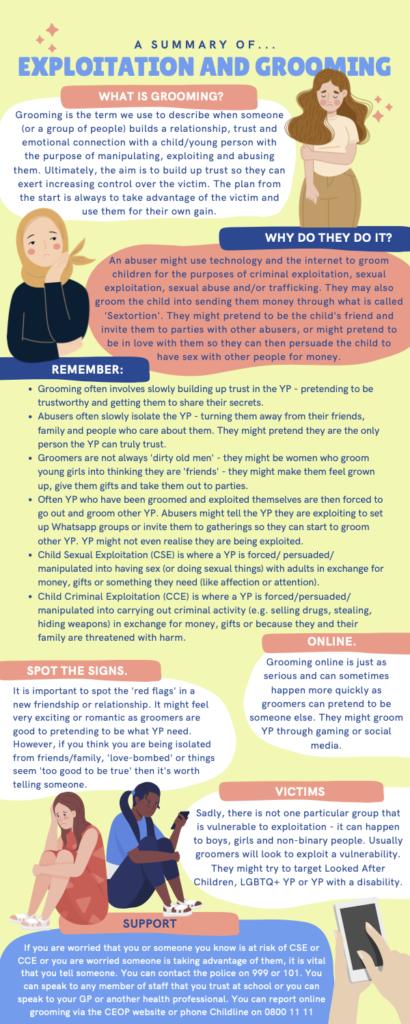
A summary of County Lines
What is it?
County Lines is a form of criminal exploitation where criminal gangs persuade, coerce, manipulate or force young people (YP) to store drugs and money and/or transport and sell them to suburban areas, market towns and coastal towns.
What happens?
YP might be targeted by criminals who want to force or manipulate them to commit crimes. They will be showered with gifts or given drugs and alcohol in order to befriend them. They are often then made to believe that they have accrued some sort of ‘debt’ to the gang, and they have to then work for them to pay off the debt. The gang might even threaten to harm them or their families if they don’t agree to ‘work’ for the gang.
Remember
- Criminals use YP in order to maximise their profits and also to distance themselves from actually physically dealing drugs. YP therefore do most of the ‘legwork’ and thus take the most risk.
- There are several other serious associated risks. For instance, the Home Office has reported a strong link between county lines activity and:
- serious violence such as knife and gun crime
- the use of substances such as acid as a weapon
- murder
- YP can be afraid of trying to leave gangs, seeking support or reporting to police due to the threat of revenge violence towards them or their families. Threats of rape of the young person or their family members can also be used. Young people may have been witness to other revenge attacks and this is used to instil fear.
- However, it is vital to seek support. County Lines exploitation is illegal and a serious form of child abuse. Victims and their families can be supported by specialist police teams.
Grooming
A victim of County Lines may be groomed in much the same way as a YP who is groomed for sexual exploitation. Abusers may make them feel special, and like they have a sense of purpose and belonging. They often shower them with gifts, clothing and money.
Trafficking
Young people can be trafficked across the country to rural and/or coastal areas to sell drugs, hide weapons or transport money. Young people may still believe their abusers are their friends and struggle to realise they are being used and manipulated. Many YP will feel unable to leave the gang.
‘Lines’
One of the reasons why criminal gangs engage in county lines drug trafficking is because they believe that be ‘crossing county lines’, police from different areas are less likely to be able to share information and monitor their activity. However the phrase ‘county lines’ actually refers to the dedicated phone lines used to organise the criminal activity.
YP are given a phone and will feel forced to respond to every text and phonecall.
Support
If you are worried about yourself or another YP being groomed or forced into exploitation of any kind; it is important that you tell someone and get help. What is happening to you in abuse and it is illegal. You can call Childline on 0800 11 11 or the police on 999 or 101. If you’d rather remain anonymous, you can contact Crimestoppers on 0800 555 111.
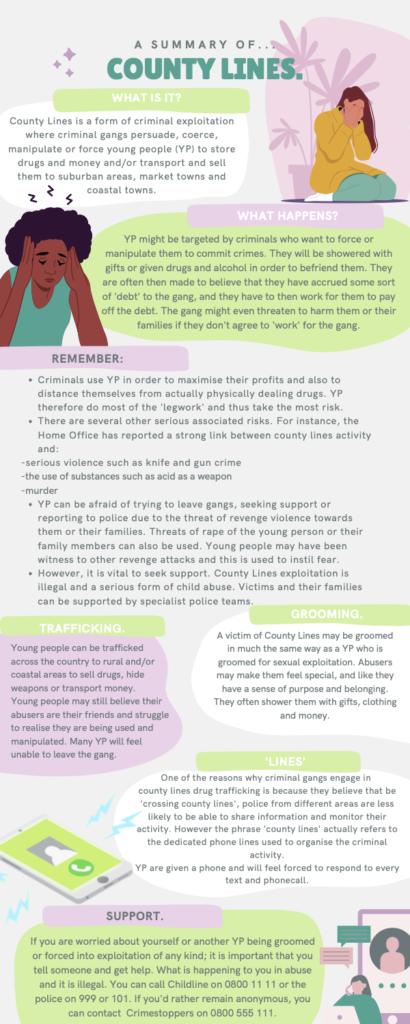
Filtering and Monitoring - Update for Parents and carers
How do we keep your child safe online, at school?
Every school should have filtering and monitoring systems on all of their devices – including any computers and technology that students use.
Smoothwall
The system that we use is called Smoothwall. It enables us to filter out any inappropriate and/or harmful content so the students cannot access it.
Monitoring
Monitoring also enables us to spot and understand what our students might be looking at or searching for online.
Our DSL Mrs Sahonta has overall responsibility for filtering and monitoring.
Safeguarding
If students try to access something inappropriate, Smoothwall lets us know. This way, we can support them and keep them safe. It also sends us an immediate alert if it spots that a child may not be safe (e.g. if they are searching for something to do with drugs, weapons or suicide).
Even with the best system in the world, things can slip through the net. Therefore, we regularly analyse our filtering and monitoring system to make sure it is effective. We would like YOU to be part of this and to let us know if you have any concerns or questions relating to filtering and monitoring (contact your child’s Head of Year 0n 0121 5538122)
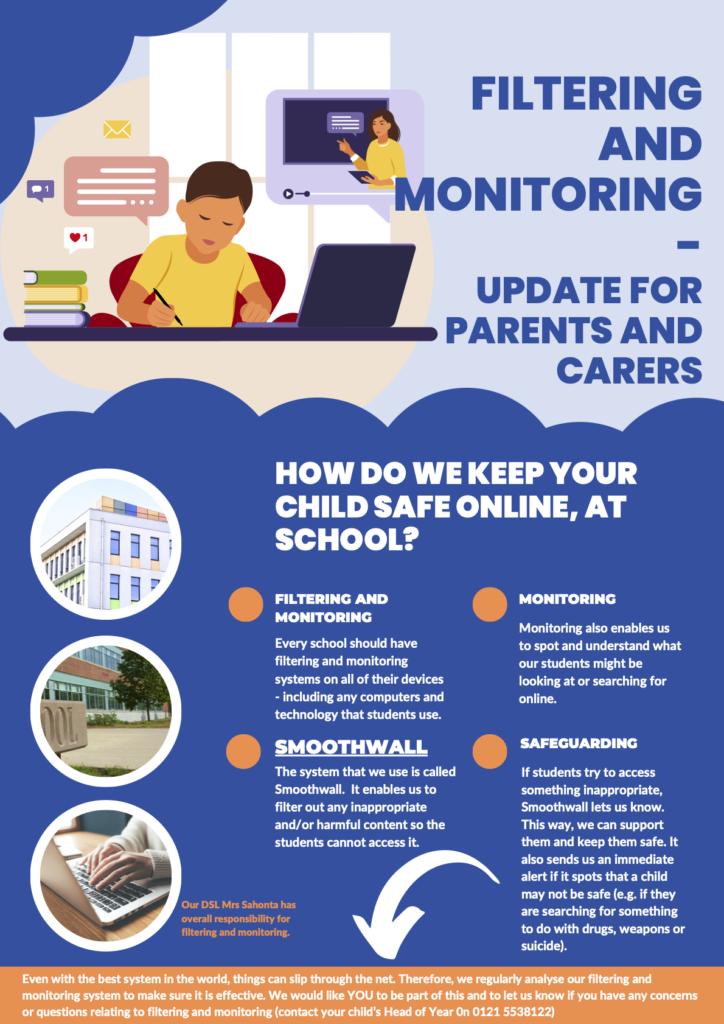
A summary of So-Called 'Honour' based abuse
What is it?
So-called ‘Honour’ -based abuse (HBA) is a crime or incident committed to protect or defend the ‘honour’ of a family/community.
If your family/community think you’ve shamed or embarrassed them by behaving in a certain way, they may punish you for bringing ‘shame’ upon them or for breaking their ‘honour’
What happens?
Statistically, HBA is used mainly to control the behaviour of women and girls within families or other social groups in order to protect supposed cultural and religious beliefs, values and social norms in the name of ‘honour’. Girls may be punished for things like not dressing in the way their family/community think they should, answering back, having a boyfriend or identifying as LGBTQ+ for example.
Different forms of HBA
Technology can be used to facilitate HBA e.g.
- Young people might be ‘watched’ online by members of the family/community to check they are not bringing dishonour upon the family
- Family/community members using Whatsapp and other social media to speak to community members overseas to arrange forced marriage
- Mobile phones and devices used to book tickets overseas for victims
- Honour-Based abuse such as acid attacks being arranged online.
- Sending threats online to the victim or to encourage a ‘forced suicide’
Other forms include but are not limited to:
- Forced Marriage
- Domestic Abuse (physical, sexual, psychological, emotional or financial)
- Sexual Harassment and Sexual Violence including the threat of rape and sexual assault
- threats to kill, physical and emotional violence and murder
- pressure to go or move abroad
- being kept at home with no freedom
- Removal of the telephone, internet, or access to important documents like your passport or birth certificate
- isolation from friends and members of your own family
Technology
Those who carry out HBA are often close family members but also extended family or community members. Abuse is often violent, but not always. It may include manipulation such as family members pretending to be unwell due to the young person’s choices or behaviour. Some family members may even threaten to harm or kill themselves.
Legalities
HBA is a form of domestic abuse and therefore is illegal. It is NEVER ok even if it is perpetrated by the victim’s family members. Committing HBA may result in those perpetrating the abuse, and those supporting them to do so, being convicted and having a prison sentence.
Victims
HBA can happen within the UK or abroad, if a YP is taken overseas with the aim of punishing them for the perceived ‘shameful’ behaviour. It does not just happen in certain religious or ethnic communities, but can affect anyone. It is worth remembering that YP have their own human rights and should not be forced into behaving a certain way.
Support
If you are worried about yourself or another YP being subjected to so-called ‘honour’ -based abuse, it is important that you get help. You can call Childline on 0800 11 11 or the police on 999 or 101. If you’d rather remain anonymous, you can contact Crimestoppers on 0800 555 111 or the Karma Nirvana hotline on 0800 5999 247 / Mon-Fri 9am-5pm.
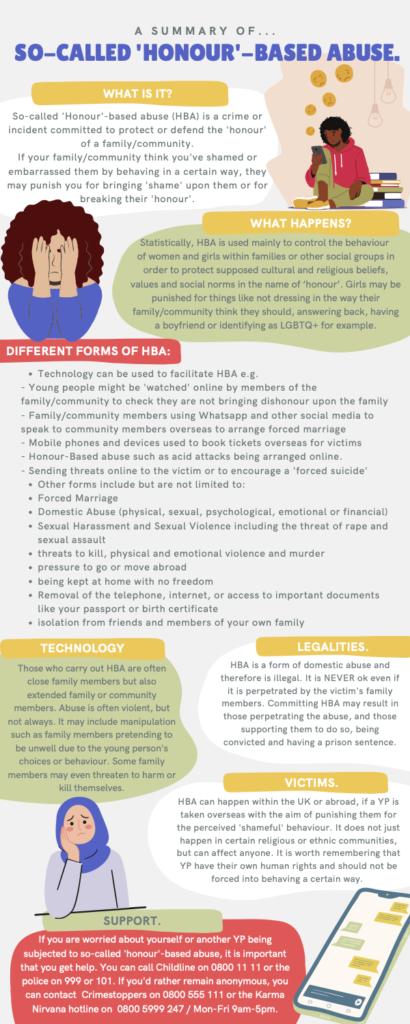
A summary of Forced Marriage
What is it?
Forced marriage (FM) is where one or both people do not or cannot consent to the marriage and pressure or abuse is used to force them into the marriage. FM is illegal in the UK and is a form of domestic abuse.
Legalities
In the UK, you must be 18+ to get married. Since Feb. 2023, it has been a crime to take any action with the aim of causing a child to marry before their 18th birthday, even if violence, threats or another form of coercion are not used. This applies to non-binding, unofficial ‘marriages’ as well as legal marriages. Remember: It is illegal for anyone of any age to be forced into marriage.
Remember
- Despite some families and communities saying so, no major world religions condone FM.
- FM is NEVER ok, and it is not a ‘cultural practice’ that should be ignored.
- Everyone deserves the right to choose who they marry or if they marry at all.
- Force can be physical or emotional/psychological for example:
- physical violence and/or sexual violence
- intimidation or threats
- withholding food or money until the person agrees to the marriage
- making someone feel like they are bringing ‘shame’ on their family
- family members threatening to kill themselves if they don’t agree to the marriage
- Family or community members ignoring and excluding someone to force them into agreeing to the marriage
- Family or community members might pretend that the person refusing the marriage is ‘making them unwell’ and will make the person feel guilty until they agree
- FM is not at all the same as an arranged marriage which is where two people willingly agree to be matched with someone suitable, who has been chosen by the family/community. They are able to change their mind, or to say no.
People with S.E.N.D
Some young people with physical and/or learning disabilities can be more vulnerable to forced marriage. Their families may even believe they are helping them. However, this is not true and EVERYONE has the right to make their own choices about marriage.
LGBTQ+
Some young people from the LGBTQ+ community can be more vulnerable to forced marriage. Remember – there is NOTHING wrong with being LGBTQ+ and any efforts to ‘cure’ someone from being gay for example, by forced marriage or other means are abusive and illegal.
Victims
Anyone can be a victim of forced marriage – boys, girls and non-binary people. Victims of forced marriage can be from a wide range of ethnicities and cultural and religious (and non-religious) backgrounds. Forced marriage happens within the UK, on UK soil, as well as cases of people being taken out of the country to be forced to marry abroad.
Support
If you are worried that you or someone you know is at risk of forced marriage or has already been forced into marriage, it is vital that you tell someone. You can contact the police on 999 or 101. You can also contact the Forced Marriage Unit on 020 7008 0151. You can speak to any member of staff that you trust at school or you can speak to your GP.
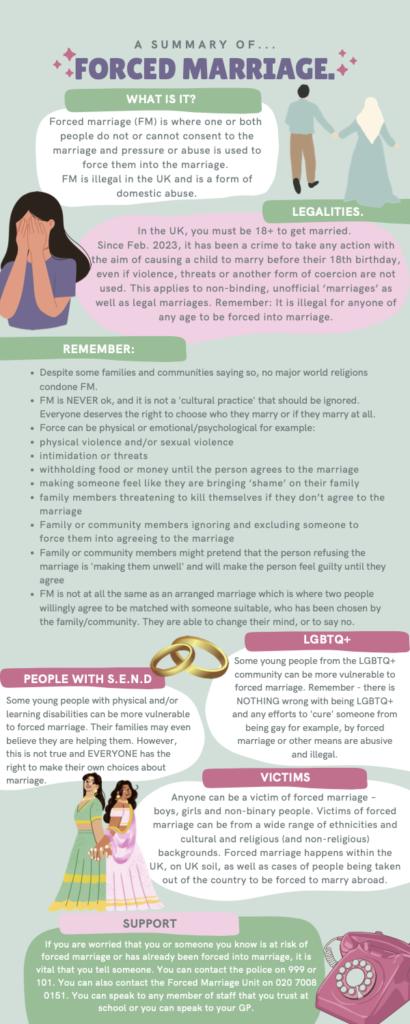
A summary of Female Genital Mutilation
What is FGM?
A procedure of partial or total removal, of the external genitalia of girls and young women for non-medical reasons. It may also involve deliberate cutting or injury to the genitalia. FGM might involve removal or injury to the clitoris and/or the labia, narrowing of the vaginal opening and/or pricking, piercing, cutting, scraping or burning the area.
Legalities
It is illegal in many countries. In the UK, carrying out FGM or assisting, facilitating or arranging for FGM to take place can carry a prison sentence of 14 years. FGM is a form of child abuse. It is usually carried out on young girls between 0-15, however adult women may experience FGM too. It’s very painful, often conducted by someone with no medical training, without anaesthetic and using unsterilised tools.
Remember
- Despite some families and communities saying so, none of the major world religions condone FGM.
- FGM is NEVER ok, and it is not a ‘cultural practice’ that should be ignored. Everyone deserves the right to autonomy over their own bodies.
- FGM is also known as female circumcision, ‘cutting’ or sunna. The Summer months are sometimes known as ‘cutting season’ as the Summer holiday may give perpetrators the opportunity to take girls abroad for FGM or arrange FGM within the UK.
- A victim might know they are at risk because older sisters or cousins have been subjected to FGM.
- Family members might tell a girl that she will be having ‘a special ceremony or procedure’.
- Despite what they might be told, FGM does not make the victim ‘clean’, ‘pure’ or a ‘good wife’. Nor is this something she should go through to ‘become a woman.’
- Despite what the media depicts, FGM is not an ‘African’ or ‘Muslim’ issue -it is a practice found throughout the world, including within the UK.
Risks
The risks are vast – It can seriously harm the physical and psychological health of women and girls.
It can also cause long-term problems with sex, childbirth and mental health. It is vital to remember that in some cases, severe blood loss and/or infection can lead to death.
Symptoms
Symptoms include:
- Constant pain
- Difficulty urinating
- Repeated infections which can lead to infertility
- Bleeding, cysts and abscesses
Victims
Sadly, FGM is a practice taking place in the UK and within the West Midlands area. Some children may be taken out of the country for the purpose of FGM being performed on them, whilst others may become a victim of FGM within the UK.
Support
If you are worried that you or someone you know is at risk of FGM or has already experienced FGM, it is vital that you tell someone. You can contact the police on 999 or 101. You can speak to any member of staff that you trust at school or you can speak to your GP or another health professional. The NSPCC FGM Helpline is 0800 028 3550 or you can phone Childline on 0800 11 11
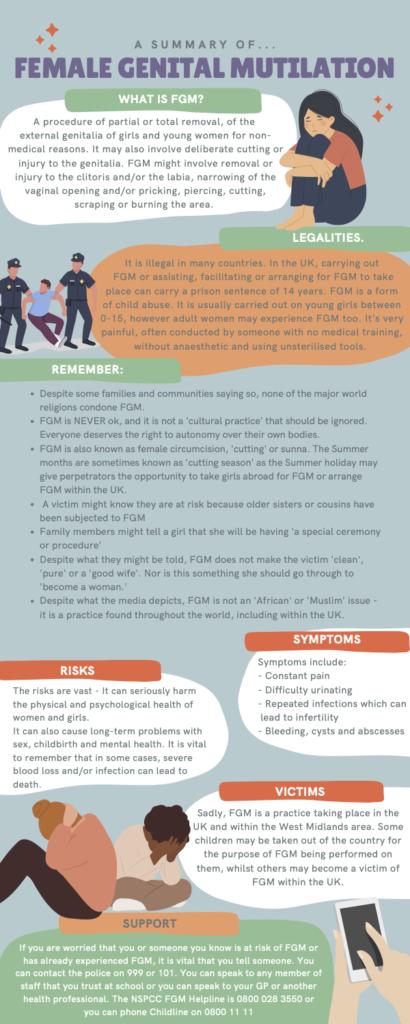
Keeping your children safe online while at school and using school provided devices is of paramount importance to us.
You can find guidance on Digital Learning and Digital Parenting in the Parent Section of our website.
Here we will run through some of the key safeguarding areas within online safety and provide guidance for you should you, your family or community encounter any of these issues.
The Prevent Duty - A summary for parents and carers
Prevent is a national safeguarding programme that supports people who are at risk of becoming involved with terrorism through radicalisation. Prevent is part of the government response to terrorism.
All schools have a duty (‘The Prevent Duty’) to report if they are concerned that a child/adult is being radicalised or may be a risk to others. This is so they and others can be kept safe and be supported.
Radicalisation means someone is being encouraged to develop extreme views or beliefs in support of terrorist groups and activities. Someone might be groomed and radicalised by others or become radicalised through accessing extremist content themselves, both online and offline. The government’s definition of ‘ extremism’ is:
“the promotion or advancement of an ideology based on violence, hatred or intolerance, that aims to:
- negate or destroy the fundamental rights and freedoms of others; o
- undermine, overturn or replace the UK’s system of liberal parliamentary democracy and democratic rights; or
- intentionally create a permissive environment for others to achieve the results in (1) or (2).”
Risks include (but are not limited to) a person supporting Far-Right extremism, Islamistextremism, anti-LGBTQ+ extremism or animal rights extremism. They may also have MUU (mixed, uncertain or unclear ideologies) which includes Incel ideologies. It may not be clear which ideology they support but they may appear to support mass murder or idolise terrorist attackers.
Signs that a child could be being radicalised include: increasingly secretive behaviour, spending lots of time online, talking about ‘new friends’ who seem to have a lot of influence, seeming to hate/blame a particular group of people for the problems of the world/country, drawing signs and symbols that suggest they are part of a group or gang or an unusual change in behaviour and/or appearance.
Children with SEND can sometimes be more susceptible to radicalisation for a wide range of reasons including:
- feeling more socially isolated (and therefore needing connection with others, and potentially spending more time online),
- perhaps finding it more difficult to read ‘red flags’ in terms of someone trying to manipulate them and also,
- perhaps being more ‘black and white’ in their thinking. Sadly, some abusive adults will target children with SEND because they view them as being more easily influenced.
Every education setting has a SPOC (Single Point of Contact). They are responsible for dealing with Prevent concerns and making referrals to the Prevent team at the Local Authority. The SPOC at HWGA is Malika Sahonta (DSL and Assistant Headteacher). If you are worried your child may be at risk of radicalisation, call us on 0121 5538122. You can also speak to the police on 101 or the police anti-terrorist hotline on 0800 789 321 in an emergency situation. If you spot concerning content online, you can report this at www.gov.uk/report-terrorism
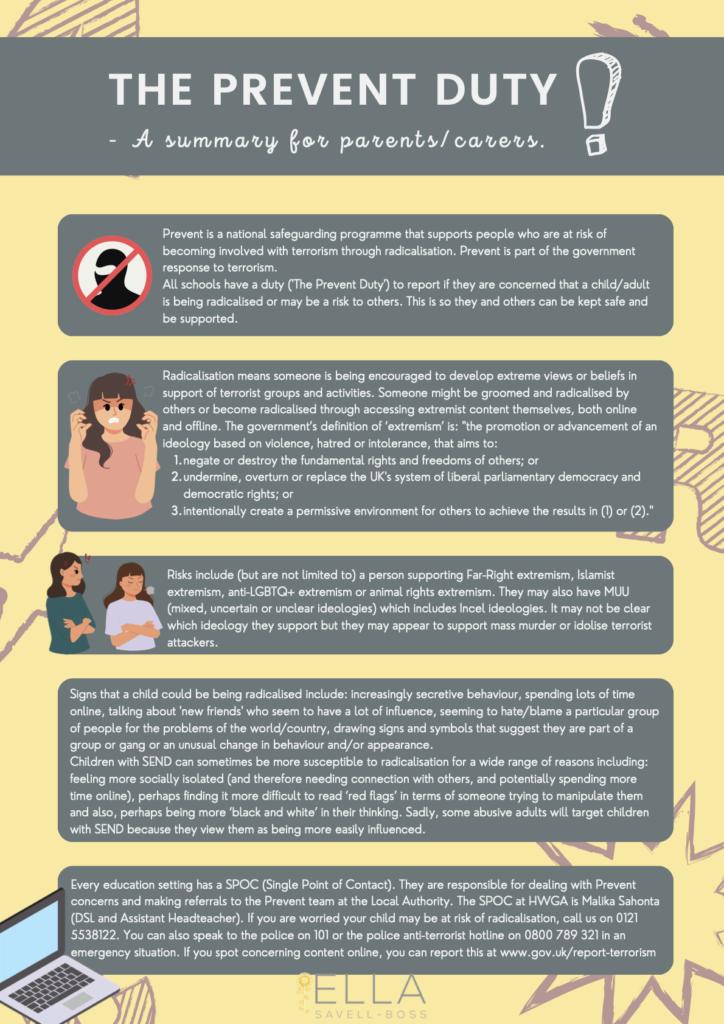
Filtering and Monitoring - Update for Parents and carers
How do we keep your child safe online, at school?
Every school should have filtering and monitoring systems on all of their devices – including any computers and technology that students use.
Smoothwall
The system that we use is called Smoothwall. It enables us to filter out any inappropriate and/or harmful content so the students cannot access it.
Monitoring
Monitoring also enables us to spot and understand what our students might be looking at or searching for online.
Our DSL Mrs Sahonta has overall responsibility for filtering and monitoring.
Safeguarding
If students try to access something inappropriate, Smoothwall lets us know. This way, we can support them and keep them safe. It also sends us an immediate alert if it spots that a child may not be safe (e.g. if they are searching for something to do with drugs, weapons or suicide).
Even with the best system in the world, things can slip through the net. Therefore, we regularly analyse our filtering and monitoring system to make sure it is effective. We would like YOU to be part of this and to let us know if you have any concerns or questions relating to filtering and monitoring (contact your child’s Head of Year 0n 0121 5538122)

A summary of Digital Footprints
What is it?
A ‘digital footprint’ or ‘digital tattoo’ as it is sometimes known, is a term we use to describe the information about a person that exists on the internet as a result of their online activity. It’s like a trail you leave behind when you use the internet or a computer. This might include the sites you have visited, the people you have communicated with, images shared, games played, comments made and items purchased.
Considerations
It is crucial to monitor children’s online activity. If they don’t use the internet themselves (remember though, that gaming, using WhatsApp and YouTube involve internet use), it’s vital that we consider what information about them could be online – either due to our own posting and sharing or that of others. Let your child know that their actions online have consequences and can hurt others or come back to haunt them in later years!
Remember
- It is not a problem per se to HAVE a digital footprint. In fact, all of us do if we use the internet in any way, shape or form. It is important however to be aware of how this could affect us in the future.
- The good thing is, we do have some control over the size of our digital footprint and what it might say about us. Sometimes googling our own name can help us to realise just how much information there could be out there. Remember, that if we can find out, so can future employers, landlords, university admissions teams and even future partners or friends.
- You leave a tiny digital marker or footprint behind each time you visit a website, click on a link, tap on a video, play an online game etc. These are different from ordinary footprints because they don’t automatically disappear. Even though you can’t always see the trail, it could be there for good. What happens online does not always stay online!
- It is important to talk to our children about the effects of their digital footprint. For example, something silly that they posted 5 years ago could be found by someone who is making a decision about giving them a job, work experience, or a college place. It’s important that children know they need to think before they post.
How to help
If children post images of themselves online, it is important to check these first to ensure they are not inappropriate in any way. Try to talk to your child about who might gain access to these images and why. Conducting a ‘social media spring clean’ once a month can be useful in order to monitor photos that – while not indecent- may be embarrassing or inappropriate.
Be Aware
Some families find it very useful to have a ‘digital contract’ which is a fun way to put in place rules around internet use. It might include that the child can use social media but only if they share passwords with parents, or that parents/carers can check the child’s images once a week.
Listen
If your child has made a mistake online, or posted something they regret – there are several steps to take. Firstly, delete the comment as soon as possible. If the comment has been sent TO someone, it may be worth deleting it then sending a message from you as parent/carer apologising and explained why you have deleted it.
Support
Remember, if you are worried, you can contact us at HWGA on 0121 553 8122 for some help. If indecent images have been shared, you can use the Childline Report, Remove Tool. Internet Matters is a useful website for advice on how to keep your child safe online. National Online Safety has a free app for parents/carers.
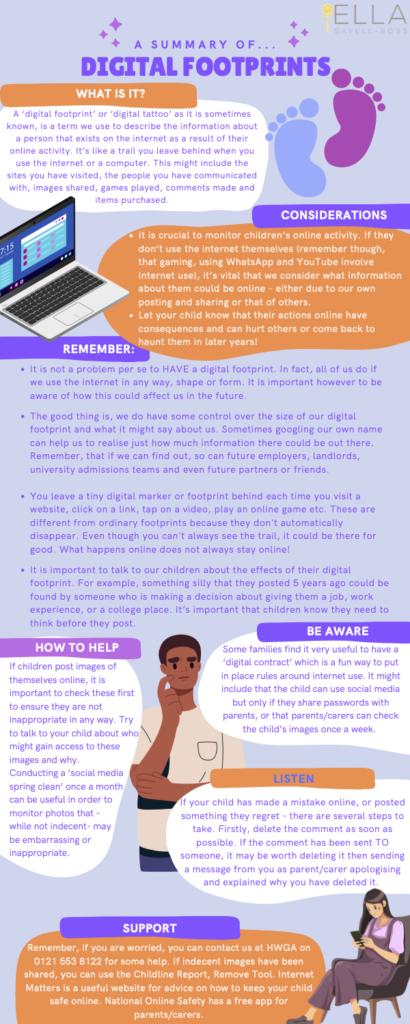
- Speak to them – Don’t feel you need to know all the answers. Start the conversation now and ask your child to teach YOU about what they like doing online and how they stay safe.
- Monitor them – Depending on your child’s age and stage, consider how you can monitor their time online. Examples include: handing in devices at night, a weekly check-in, having access to their passwords or only allowing device use in communal areas (e.g. the lounge)
- Set boundaries – If your child wants to get a new device, consider setting up a ‘Family Agreement’ (Childnet have a fantastic template). You can set family rules such as ‘no phones at the dinner tables’ – but you’ll need to stick to them yourself!
- Play it first! – Some families find it useful to only allow their child to have a social media account, or play an online game IF their parent/carer uses the same social media platform (and is a friend or contact on there). Playing online games first to see if they are suitable is also a wise option.
- Do your research – You don’t need to be an expert on online safety but there are loads of helpful, free resources out there. Try the Internet Watch Foundation, National Online Safety (who have a free app for parents/carers), ThinkUKnow and Internet Matters. Remember to check the PEGI ratings (like an age certificate, but for games) before you allow your child to buy or play an online game.
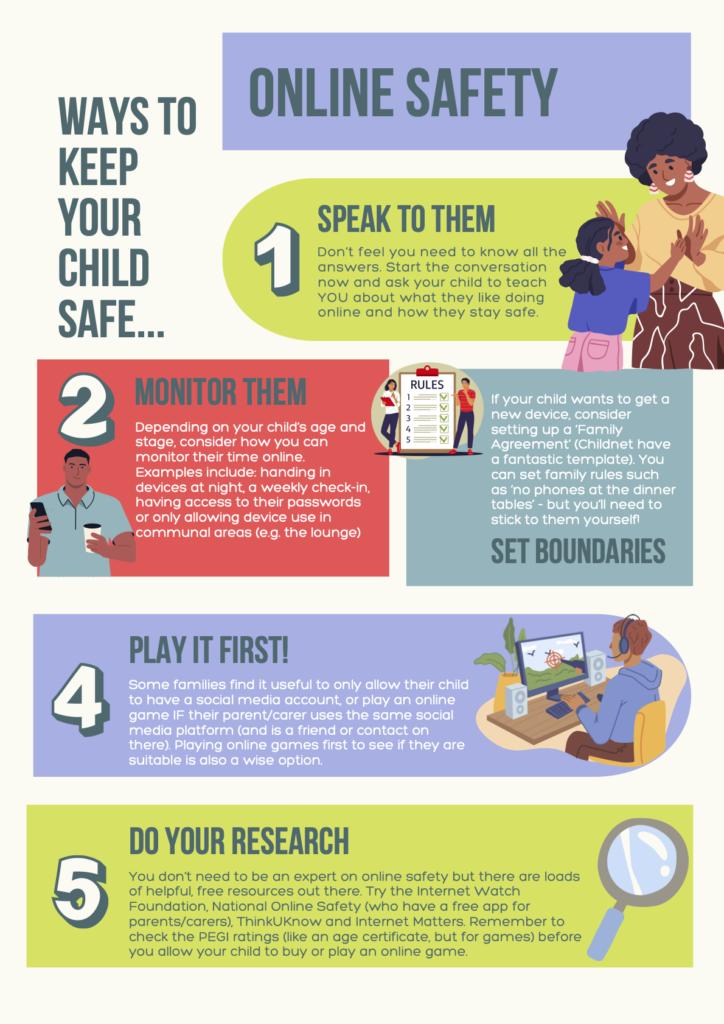
Childnet Family Agreement
Family Agreement
A great way to start positive family conversations around online safety, and to agree clear expectations and boundaries.
Start by discussing the questions that are most relevant to your family.
Getting started
- What do we enjoy doing online?
- What apps, games and websites do we use the most?
- Do we already have any rules about use of tech we want to include in our family agreement?
Managing time online
- How does it feel when we use tech for too long?
- How do we know when our screen use is interfering with family life?
- What can we do to help avoid overusing tech?
Sharing
- What should we check before posting images and videos online?
- Do we know how to use privacy settings and what makes a strong password?
- How can we use features like live-streaming and disappearing content safely?
Online content
- How do we decide which websites, apps, games and devices are okay for us to use?
- What can we do if we see something online which seems unreliable or untrustworthy?
- How can we stop ourselves accidentally spending money in a game or app?
Want expert advice?
www.childnet.com/parents-carers-advice
Communicating online
- Who can we talk, chat or play games with online? Just family? Friends? Anyone?
- How can we keep ourselves safe if we are communicating with people who we only know online?
- How can we look after our friends when we are online?
If things go wrong
- What can we do if we feel uncomfortable or upset by anything we see or hear online?
- What should we do if someone we only know online asks us for photos, a video call, to meet up or to share personal information?
- Do we know how to find the report and block buttons on the websites, apps and games we use?
To finish…
- How could parental controls help our family?
- What should happen if one of us breaks the family agreement?
- When should we review our family agreement?
Download the agreement here
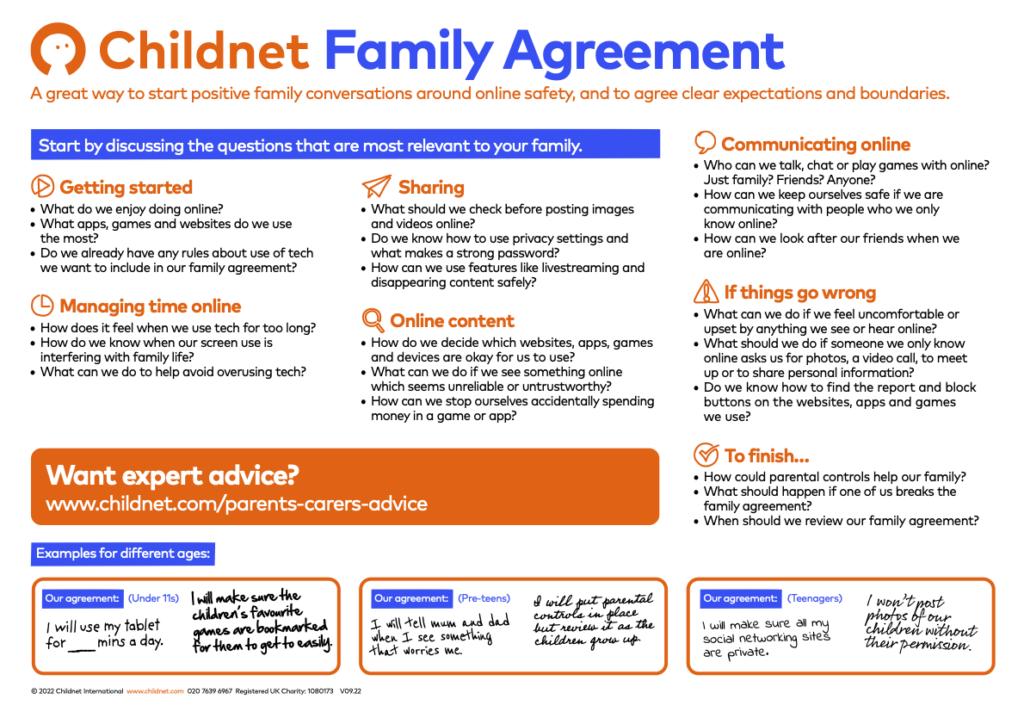
Sextortion - A summary for parents and carers
What is Sextortion?
‘Financially motivated Sexual Extortion or ‘Sextortion’ for short, is when a child or adult is forced into paying money or meeting another financial demand after an offender has threatened to release nude/semi-nude images or videos of them. The National Crime Agency in 2024 put out an alert to all schools to raise awareness of this growing risk.
What might I spot in my child?
- Stealing (from home, school, even their teachers and friends)
- Becoming increasingly withdrawn and appearing pre-occupied
- Demonstrating high levels of shame – children blaming themselves, being extra harsh on themselves for errors and mistakes
- Appearing to be in a rush to get back home, or to retrieve their device at the end of the school day
- Appearing panicked about communications with parents/carers
- Secrecy about their online activities or hiding their devices.
- Significant changes in behaviour such as mood swings, increased anxiety or anger, especially after using electronic devices or being online.
- Excessive use of the internet including throughout the night or at set times of day
- An unusual or sudden decline in academic performance, truanting, or loss of interest in school-related activities and even hobbies
Every child’s experience is unique however some common features and patterns of abuse include:
- A child or young person (CYP) might be added by an unknown contact online, or perhaps added by a hacked account of someone they know. The offender often poses as another young person in order to build up trust.
- The offender will then start chatting to them and may after some time try to move the conversation over from a social media or gaming chat, onto an encrypted messaging service such as Whatsapp or similar.
- The offender may send a nude image first or may otherwise persuade the child to send one. The images may also be deepfaked images but the threat of these being shared may still be used to blackmail the child.
- The offender may even pretend to (or actually) hack the child’s information, images etc and then threaten to share what they gain access to unless the young person sends them money.
- The child is then blackmailed into sending the offender money or doing things they don’t want to do, in order to prevent their images or information being shared.
- This usually takes place online however can happen offline too.
Who might be vulnerable?
ALL young people can be vulnerable to Sextortion. However research suggests that boys aged 14-17 are currently the main group victimised by this crime.
Previously, the main group were young women and they remain at risk.
Children with SEND may also be more vulnerable as they may be more likely to trust others, less likely to understand when they are being manipulated and there are increased barriers to disclosure, to seek support.
LGBTQ+ CYP may be targeted particularly if they are not able to be ‘out’ in supportive families and communities.
What should we do?
- Avoid victim-blaming! This form of abuse feeds off shame.
- Report to the police on 999 and children’s services as soon as possible. You can use the CEOP website to report to police. Birmingham CASS is 0121 3031888
- Use tools such as Childline’s ‘Report Remove’ and NCMEC’s ‘Take It Down’ which enable you to register the image so it cant be reshared
- DO NOT tell children to delete and block. It’s important to keep evidence such as images, screenshots, usernames and bank details.
- Report directly to the platform/app that has been used
- Reassure the child that they have done the right thing and this is not their fault.
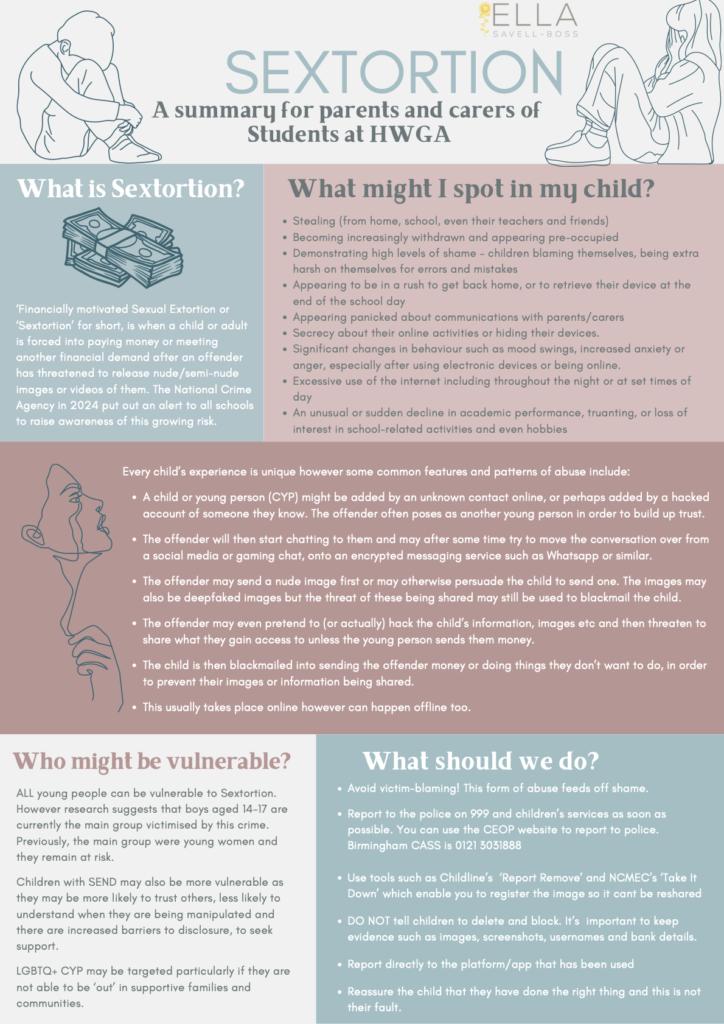
March 2025
This Month’s Online Safety Theme is: ‘Catfishing’
Catfishing is the act of creating a false identity online to deceive others, often for romantic or financial gain. This can be particularly harmful to vulnerable individuals, including children who are LGBTQ+, have English as an additional language and/or those with SEND, who may have difficulty recognising manipulation and deceitful behaviours. People who catfish others can sometimes do it for the thrill of deceiving someone – and they are highly skilled at creating a fake life, and pretending to be romantically interested in someone. Others do this purely in order to get someone to give them money or sexual photos for example.
The emotional toll of catfishing can be profound, leading to feelings of betrayal and isolation. This is true for adults but even more serious for young people – particularly those who have not had a close friendship or relationship before. Finding out you’ve been tricked and someone does not, in fact, have feelings for you – and may even have been mocking you, can feel devastating and humiliating.
There are lots of things we can do to support our children to recognise and understand catfishing. Firstly, monitoring our children online including who they are talking to and gaming with is helpful, as we can then ask questions if there seems to be a new person on the scene.
Secondly, depending on your child’s level of understanding, we can explain to them that some people are not who they say they are.
Talking about famous examples or film characters can be useful – such as Ursula The Witch pretending to be someone else, in Disney’s The Little Mermaid or the Marvel character Emma Frost who shapeshifts and reads minds.
Setting up privacy controls on social media platforms can also help protect children from potential predators.
At HWGA, we have an acceptable use agreement for the students to sign when they use school devices.
These are also just good sense, and you can talk them through with your child. You can read the Acceptable Use Policy by requesting a copy from the academy’s reception.
As always, if you are worried about online safety issues affecting your child, you can always contact us for support. You can contact your child’s Head of Year on 0121 553 8122.
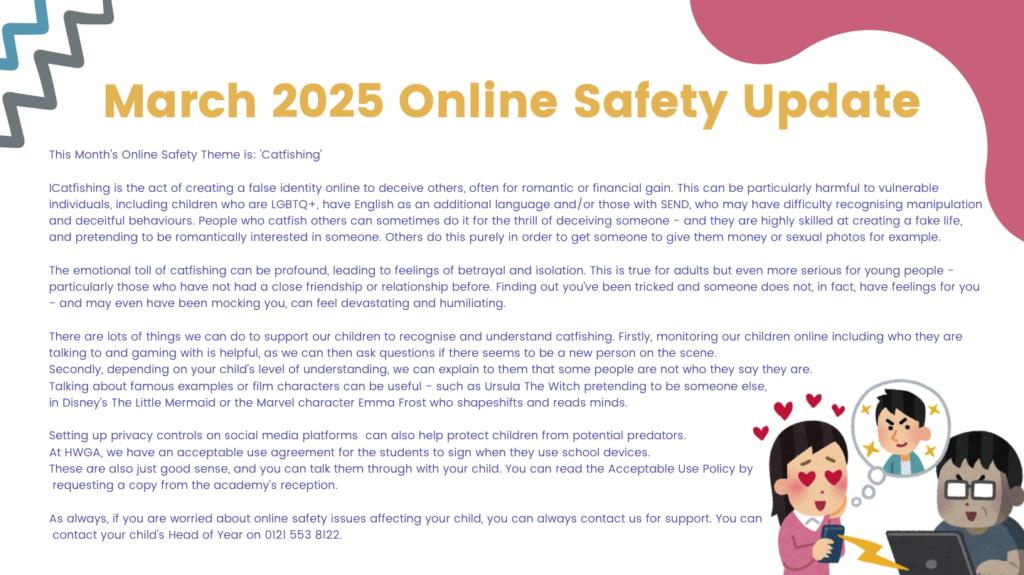
February 2025
This Month’s Online Safety Theme is:’Keeping our private information private.’
We often speak to our children about not sharing key information about themselves online – however, we can sometimes forget to take our own advice.
If we share our personal information online, we can put ourselves and our families at risk of identity theft, burglary, false information being shared and more.
For many of us, we have heard these messages time and again, but it is worth keeping mind what information we are putting out there without realising it. For example, do you put your holiday snaps on social media while you are still away? If so, you are making it clear to everyone that you are not at home. Some insurance companies will refuse to pay out if you get burgled following social media posts that show you’re not at home. The solution? Save posting the photos for when you’re back.
Similarly, do you tag your location when you’re out and about? You might be showing people that you go shopping at a particular supermarket every Thursday night, or that you work out at a particular gym.
Another easy mistake to make is when we use social media to arrange parties and gatherings. While we may feel happy with everyone we have invited knowing our home address, do we feel OK with other people seeing a screenshot of the address?
Some helpful tips can be to ensure your privacy settings are set to private and to every 6 months or so, check through your online contacts. Ask yourself, are you still OK with that colleague from 8 years ago knowing all about your children? If not, change your settings. When we do this, it’s good to talk to our children about what we are doing – and why. This way we can model positive online safety strategies, and they can see the benefits, They can even watch us as we unfriend old contacts, remove photos and change our settings.
As always, if you are worried about online safety issues affecting your child, you can always contact us for support. You can speak to your child’s Head of Year on 0121 553 8122
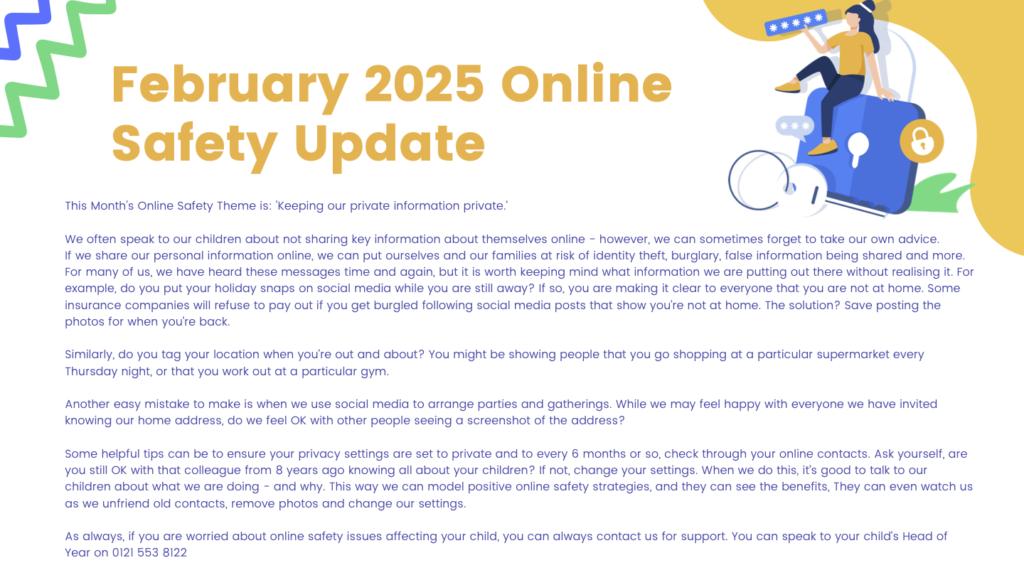
January 2025
This Month’s Online Safety Theme:
‘Social Media Spring Clean’
While the nights are still long and we might have made some new year resolutions, it can be a great time to give your child’s devices a thorough ‘spring clean’! While this might mean a physical clean (as laptops and devices can be home for many germs!); it is important to ensure you are aware of – and happy with – what your child is accessing, who your child is communicating with, what they are buying and which sites they use online.
While they may not have their ‘own’ device, if your child uses the internet in any capacity, you could take just five minutes to:
- Review their search history together, or encourage them to share what they typically look for online. This is a valuable opportunity to ensure they are accessing safe, accurate, and helpful information.
- Check their friends and contacts list – do these people seem to be safe? Do they know them online or in real life? What are their interactions like?
- Examine the suitability of the online games they play – are there any harmful themes?
- Assess what personal information they have posted online. Could they be easily identified, or is their personal information at risk of being stolen?
- Check any images or videos they have shared. Are these safe, and who has access to them? Your child may wish to choose to remove old or embarrassing photos, even if you, as their parents, like them. Try to respect your child’s wishes.
Discuss with your child the idea of starting fresh for the new year, and consider deleting anything that could pose a risk. You can assist them in updating their passwords or closing any old social media or gaming accounts. This proactive approach will empower them to take control of their online presence.
